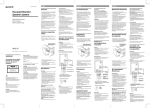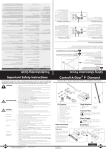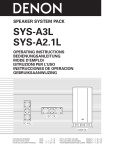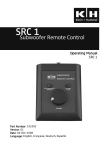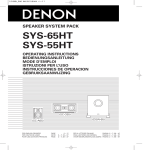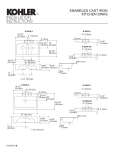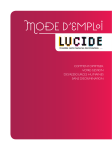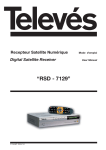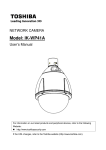Download Sony SMS-2P User's Manual
Transcript
3-858-673-12(1) Powered Monitor Speaker System Operationg Instructions EN Mode d’emploi F Bedienungsanleitung D SMS-2P ©1997 by Sony Corporation WARNING To prevent fire or shock hazard, do not expose the unit to rain or moisture. To avoid electrical shock, do not open the cabinet. Refer servicing to qualified personnel only. Do not install the appliance in a confined space, such as a bookcase or buitl-in cabinet because the mains power switch (MAIN POWER) is located on the rear exterior. NOTICE FOR THE CUSTOMERS IN THE U.S.A. This symbol is intended to alert the user to the presence of uninsulated “dangerous voltage” within the product’s enclosure that may be of sufficient magnitude to constitute a risk of electric shock to persons. This symbol is intended to alert the user to the presence of important operating and maintenance (servicing) instructions in the literature accompanying the appliance. CAUTION You are cautioned that any changes or modification not expressly approved in this manual could void your authority to operate this equipment. Owner’s record The model and serial numbers are located on the rear of the unit. Record the serial number in the space provided below. Refer to them whenever you call upon your Sony dealer regarding this product. Model No. SMS–2P Serial No. 2 NOTICE FOR THE CUSTOMERS IN CANADA CAUTION: TO PREVENT ELECTRIC SHOCK, DO NOT USE THIS POLARIZED AC PLUG WITH AN EXTENSION CORD, RECEPTACLE OR OTHER OUTLET UNLESS THE BLADES CAN BE FULLY INSERTED TO PREVENT BLADE EXPOSURE. Table of Contents Precautions .............................................. 4 Speaker connections and placement ... 5 Names and Functions of parts .............. 6 Specifications .......................................... 8 Characteristic data .................................. 9 Features • Professional quality inputs with high handling capacity (Balanced terminal +24 dB, phone and phono terminals +10 dB). • Allows mixing of two different input sources. • Magnetically shielded design allows placement near display monitors, TVs, etc. • 2 way speaker and wood cabinet designed for high fidelity. • Use of sandwich construction in baffle board damping. • Up to 20 of these speakers can be connected via cascade connections. This speaker was designed as a reference for use in recording studios to provide an accurate reproduction of the mix balance. In order to convey the full realistic expression and power of the artist while maintaining a supreme musical charm, we've carefully considered each of the individual parts as well as every inch of the circuit board. EN We are confident you’ll enjoy this unique speaker both in and out of the studio. 3 Precautions • Remove the protective cover after you have connected the speaker and placed it in its final position. • When listening at large volumes, we recommend keeping the sound at a level where it does not distort. • To prevent damage to the speaker unit, be sure to attatch the supplied protective cover when moving the speaker or placing it in storage. on safety • Do not attempt to open the enclosure or modify the speaker unit. • Before operating the speaker, be sure that the operating voltage of your speaker is identical with that of your local power supply. • Unplug the speaker from the wall outlet if it is not to be used for an extended period of time. To disconnect the cord, pull the cord by grasping the plug. Never pull the cord itself. • Should any liquid or solid object fall into the speaker, unplug the speaker and have the speaker checked by qualified personnel before operating it any further. • AC power cord must be changed only at the qualified service shop. When turning on or off other equipment Lower the volume of the speaker to minimum. In case color irregularity is observed on the nearby TV screen With the magnetically shielded type of the speaker system, the speakers can be installed near a TV set. However, color irregularity may still be observed on the TV screen depending on the type of your TV set. If color irregularity is observed... Turn off the TV set once, then turn it on after 15 to 30 minutes. If color irregularity is observed again... Place the speakers further apart from the TV set. 4 If it still persists... Check that there is no other source of magnetism* near the TV set. Any other source of magnetism can cause color irregularity due to an interaction with the speaker. * Examples of sources of magnetism: Rack, magnets attached to secure the doors of the TV stand, health tools, magnets used with a toy, etc. On installation • Do not install the speaker near heat sources such as radiators or air ducts, or in a place subject to direct sunlight, excessive dust, mechanical vibration or shock. • Good ventilation is essential to prevent internal heat buildup in the speaker. Place the speaker in a location with adequate air circulation. Do not place the speaker on a soft surface or too close to a wall as this may obstruct the ventilation hole on the back. On cleaning the cabinet Clean the cabinet with a soft cloth lightly moistened with water. Do not use any type of abrasive pad, scouring powder or solvent such as alcohol or benzine. If you have any questions or problems concerning your speaker that is not covered in this manual, please consult your nearest Sony dealer. Speaker Connections and Placement Placement The speaker can be placed vertically or horizontally. Connections Be sure to set the POWER switch on the back panel to OFF before making any connections. TW LEVEL NORMAL – MASTER VOL. + 0 10 BASS – – • We reccomend not connecting more than one sound source to each channel. • The RETURN terminal should only be used to input the sound output from the SEND terminal (after looping it through an effector, etc.) or when connecting several speakers. Connections made to the RETURN terminal for other purposes will not allow the sound input to the CH1 and CH2 terminals to be output. • Pass high impedance sources (like electric guitars) and low level sources (like microphones) through a mixer before connecting to the speaker. To connect several speakers Be sure to set the POWER switch on the back panel to OFF before making any connections. Connect the CASCADE OUT terminal on the first speaker to the RETURN terminal on the second speaker, etc. (You can connect up to 20 speakers.) TREBLE + Notes + CH 1 IN VOL SEND 3HOT 2HOT 0 10 CH 2 IN Connect only one. VOL CASCADE OUT RETURN CH IN 0 3HOT 2HOT DIRECT 10 Balanced(XLR)cord phone plug cord TW LEVEL NORMAL – ON 0 10 BASS – TW LEVEL NORMAL TREBLE + – – + MASTER VOL. + 0 10 BASS – TREBLE + – + CH 1 IN CH 1 IN VOL VOL SEND 3HOT 2HOT 3HOT 2HOT 0 0 10 10 CH 2 IN CH 2 IN VOL VOL CASCADE OUT RETURN CH IN 0 POWER MASTER VOL. + SEND 3HOT 2HOT DIRECT CASCADE OUT RETURN CH IN 0 10 3HOT 2HOT DIRECT 10 Audio phono cord POWER POWER ON ON BREAKER BREAKER BREAKER OFF OFF OFF To the output terminals of an electronic instrument, mixing console, computer, or audio device (etc.). AC IN To a wall outlet AC IN First Speaker To the RETURN terminal on the next speaker. AC IN Second Speaker How to use the slip stoppers This unit comes supplied Balanced (XLR)with cord 4 round (15 mm diameter) slip stoppers. Attach one under each of the speaker's four corners to prevent the speaker from moving when subject to slight vibrations (etc.). Balanced terminal polarity When the balanced input terminal polarity switch is set to 2HOT. When the balanced input terminal polarity switch is set to 3HOT. 1 : GND 2 : HOT 3 : COLD 2 3 1 1 : GND 2 : COLD 3 : HOT 2 3 1 5 Names and Functions of Parts Rear 1 2 3 TW LEVEL NORMAL – MASTER VOL. + 0 10 BASS – TREBLE + – + CH 1 IN VOL SEND 3HOT 2HOT 0 10 CH 2 IN VOL CASCADE OUT RETURN CH IN 0 3HOT 2HOT DIRECT 10 4 5 6 7 8 POWER ON BREAKER 9 OFF AC IN 10 11 12 13 1 SEND terminal Outputs a mix of the sounds input to channel 1 and channel 2. Connect to an effector or recording device (etc.). The sound is output as adjusted by the BASS and TREBLE. 2 TW LEVEL control Adjusts the output level of the tweeter. Turn toward the right to increase. Turn toward the left to decrease. 3 MASTER VOL. (volume) control Turning to the right increases the level of the sound output from the speaker. 4 Bass control 6 Turn to the right to increase the level of the bass. Turn to the left to decrease the level of the bass. (Increasing the level of the bass when listening at high volumes may cause the sound to distort.) 5 TREBLE control Turn to the right to increase the level of the treble. Turn to the left to decrease the level of the treble. 6 CH 1 IN (channel 1 input) See next page for details. 7 CH 2 IN (channel 2 input) See next page for details. 8 Rear panel guards Protect the controls on the rear of the speaker. Located on the left and right. 9 POWER switch Turns the power to the speaker ON/OFF. (Before turning the power ON, be sure the MASTER VOL. control is set to the “0” position.) 10 AC socket Connect to a wall outlet (120 V in U.S.A. or Canada, 220-230 V in Europe) using the supplied power cord. 11 BREAKER Press if the pilot lamp on the front panel does not light when the power is turned on. This resets the power supply so you can use the speaker. 12 RETURN terminal Use to input an external sound source directly to the speaker’s power amp. Use this terminal to input sound output to an effector, or when connecting several speakers. 13 CASCADE OUT terminal Allows you to output a mix of the sounds input to channel 1 and channel 2. Use to output sound when connecting several speakers. 4 DIRECT switch (Only for Balanced CH 1 input CH 1 IN VOL 3HOT 2HOT 0 10 4 1 2 3 5 1 INPUT VOL. (channel 1 input level) control Turning to the right increases the level of the sound output from the channnel 1 input terminal) Setting this switch to DIRECT allows you to bypass the tone controls and send the sound from a mixer (etc.) directly to the speaker's power amplifier. In this case, BASS and TREBLE adjustments are not possible. Only the MASTER VOL. and TW LEVEL can be adjusted. Note When the DIRECT switch is set to DIRECT, no sound will be output to the other speakers (if other speakers are connected). 5 Balanced input terminal 2 Pin plug input terminal Phono plug input terminal for channel 1. Connect to the output on a piece of audio equipment (etc.). 6 Balanced input terminal polarity switch 3 Standard plug input terminal phone plug input terminal for channel 1. Connect to the output on a musical instrument (etc.). Front 4 Balanced input terminal Balanced input terminal for channel 1. Connect the the out put terminal of a professionl mixing console (etc). 5 Balanced input terminal polarity switch Use to switch the polarity of the channel 1 balanced input terminal. POWER CH 2 input CH 2 IN VOL CH IN 0 3HOT 2HOT DIRECT 1 10 1 Power Indicator 1 2 3 4 5 6 1 INPUT VOLUME. (channel 2 input Lights when the POWER switch is set to the ON position. level) control 2 Pin plug input terminal 3 Standard plug input terminal 7 Inputs Specifications AUDIO POWER SPECIFICATIONS POWER OUTPUT AND TOTAL HARMONIC DISTORTION: With 6 ohm load driven, from 20 Hz 20 kHz; rated 40 watts minimum RMS power, with more than 0.9 % total harmonic distortion from 250 mW to rated output. CH 1 Phono jack x 1 phone jack x 1 XLR jack x 1 CH 2 Phono jack x 1 phone jack x 1 XLR jack x 1 OTHER RETURN jack x 1 Input level Phono jack : – 10 dBm (+10dBm) Phone jack : – 10 dBm (+10dBm) Balanced terminal : + 4 dBm (+24dBm) RETURN : 0 dBm (+20dBm) Speaker system 2 way bass reflex Speaker unit Woofer: 16 cm (6 5⁄16 inches) dia. cone type Tweeter: 2.5cm (1 inch) dia. dome type Input impedance Phono jack : 10 kilohms Phone jack : 10 kilohms Balanced terminal : 600 ohms Nominal Impedance Woofer: 6 ohms Tweeter: 6 ohms Power handling capacity Woofer: 50 W Tweeter: 40 W Sensitivity 107 dB/m Frequency range 48 Hz - 20 kHz (± 3 dB) Dimensions Approx. 239 × 410 × 331 mm (w/h/d) (9 7/16× 16 1⁄8 × 13 1⁄16 inches.) excluding projecting parts and controls Approx. 239 × 410× 365 mm (w/h/d) (9 7⁄16 × 16 1⁄8 × 143⁄8 inches.) Including projecting parts and controls Enclosure volume Approx. 14 liters Mass Approx. 13 kg (28 lb 10 oz) excluding protective cover Power requirements North American models: 120 V AC, 60 Hz Europian models: 220-230V AC, 50/60 Hz Power consumption 44W 8 Output level SEND jack : (0 dBm) CASCADE jack : (as same as RETURN level) Tone controls BASS 100 Hz : ±6 dB TREBLE 10 kHz : ±6 dB Tweeter level controls +2.5 dB/-3.5dB Supplied accessories Power cord (1) Protective cover (1) Slip stoppers (4) Instruction manual (1) Design and specifications are subject to change without notice. Characteristic data Frequency characteristics / adjustable range of tone controls 100 HI MAX LOW MAX 90 FLAT 80 70 60 1 50 40 HI MIN FLAT LOW MIN 30 20 10 0 20 50 100 200 500 1K 2K 5K 10K 20K 50K 2 1 Output sound pressure level (dB) Input : Phono Jack (– 30 dB) 2 Frequency (Hz) Volume : VOL. CH 1 master, max Anechoic room : 1 meter Frequency characteristics / adjustable range of tweeter level controls 100 TW LEVEL MAX 90 FLAT 80 70 60 1 TW LEVEL MIN 50 40 30 20 10 0 20 50 100 200 500 1K 2K 5K 10K 20K 50K 2 1 Output sound pressure level (dB) Input : Phono Jack (– 30 dB) 2 Frequency (Hz) Volume : VOL. CH 1 master, max Anechoic room : 1 meter 9 AVERTISSEMENT Afin d’éviter tout risque d’incendie ou d’électrocution, ne pas exposer cet appareil à la pluie ou à l’humidité. ATTENTION POUR PREVENIR LES CHOCS ELECTRIQUES, NE PAS UTILISER CETTE FICHE POLARISSE AVEC UN PROLONGATEUR, UNE PRISE DE COURANT OU UNE AUTRE SORTIE DE COURANT, SAUF SI LES LAMES PEUVENT ETRE INSEREES A FOND SANS EN LAISSER AUCUNE PARTIE A DECOUVERT. 2 Table des matières Précautions .............................................. 4 Position et raccordement de l’enceinte 5 Nomenclature ......................................... 6 Spécifications .......................................... 8 Données caractéristiques ....................... 9 Caractéristiques • Entrées de qualité professionnelle à tenue de puissance élevée (prise symétrique +24 dB, prises standard classiques et miniature +10 dB). • Mélange de deux sources différentes possible. • Blindage antimagnétique permettant l’installation à proximité d’un moniteur, téléviseur, etc. • Enceinte à deux voies et coffret en bois, conçue pour la haute fidélité. • Matériau d’amortissement entre les parois d’enceinte. • Raccordement de 20 enceintes en cascade possible. Cette enceinte a été conçue comme enceinte de référence pour l’utilisation en studios d’enregistrement et assure une reproduction exacte de la balance de mélange. Afin de reproduire de manière réaliste toute l’expression et la puissance de l’artiste tout en conservant un charme musical extrême, chaque pièce et chaque centimètre du circuit ont été attentivement étudiés. F Nous sommes sûrs que cette enceinte exceptionnelle fera votre joie au studio ou chez vous. 3 Précautions Précautions d’utilisation • Enlevez le panneau de protection seulement après avoir raccordé l’enceinte et l’avoir placée dans sa position définitive. • Lorsque vous écoutez à volume élevé, veillez à régler le timbre de sorte qu’aucune distorsion n’apparaisse. • Veillez à fixer le panneau de protection fourni pour ne pas endommager l’enceinte lorsque vous la déplacez ou la rangez. Sécurité • Ne pas essayer d’ouvrir le caisson ni de modifier le haut-parleur. • Avant d’utiliser l’enceinte, assurez-vous que sa tension de fonctionnement est identique à celle de l’alimentation secteur locale. • Débranchez l’enceinte de la prise murale si vous prévoyez de ne pas l’utiliser pendant longtemps. Pour débrancher le cordon, tirez sur la fiche. Ne jamais tirer sur le cordon proprement dit. • Si un liquide ou un solide tombe dans l’enceinte, débranchez l’enceinte et faites-la vérifier par un professionnel avant de la remettre en service. • Le cordon d’alimentation secteur doit être changé par un professionnel. Avant de mettre un appareil sous ou hors tension Réduisez complètement le volume de l’enceinte. Si des anomalies de couleur apparaissent sur l’écran du téléviseur à proximité de l’enceinte Ayant un blindage magnétique, l’enceinte peut être normalement installée près d’un téléviseur. Cependant, avec certains téléviseurs, vous pouvez observer des anomalies de couleurs. Si vous observez des anomalies de couleurs... Eteignez le téléviseur puis remettez-le sous tension 15 à 30 minutes plus tard. 4 Si vous observez encore des anomalies... Eloignez les enceintes du téléviseur. S’il n’y a aucune amélioration... Vérifiez s’il n’y a pas une autre source de magnétisme* près du téléviseur. Toute source de magnétisme peut causer des anomalies de couleurs par interaction avec l’enceinte. * Exemples de sources de magnétisme: Rack, aimants de portes de meuble de téléviseur, appareils paramédicaux, aimants sur des jouets, etc. Installation • Ne pas installer l’enceinte près d’une source de chaleur, comme un radiateur ou un conduit d’air, ou dans un endroit exposé à la lumière directe du soleil, à une poussière excessive, à des vibrations mécaniques ou à des chocs. • Une bonne ventilation est essentielle pour éviter toute surchauffe interne de l’enceinte. Installez l’enceinte dans un endroit où la circulation de l’air est suffisante. Ne la posez pas sur une surface molle ou trop près d’un mur afin de ne pas obstruer l’orifice de ventilation à l’arrière de l’enceinte. Nettoyage du coffret Nettoyez le coffret avec un chiffon doux légèrement imprégné d’eau. Ne pas utiliser de tampons abrasifs, de poudre récurante ni de solvant, comme l’alcool ou la benzine. Pour tout problème ou toute question au sujet de l’enceinte, non couverts dans ce manuel, veuillez consulter votre revendeur Sony. Remarques Position et raccordement de l’enceinte Position • L’enceinte peut être installée à la verticale ou à l’horizontale. • Il est conseillé de ne pas raccorder plus d’une source à chaque canal. • La prise RETURN ne doit être utilisée que pour transmettre le son fourni par la prise SEND (après passage dans un processeur d’essai, etc.) ou lorsque vous raccordez plusieurs enceintes. Tout autre raccordement à la prise RETURN ne permettra pas de transmettre le son fourni aux canaux 1 et 2. • Raccordez les sources à impédance élevée (guitares électriques) et celles à basse impédance (microphones) à un mixeur avant de les raccorder à l’enceinte. Raccordements Ne pas oublier de régler l’interrupteur POWER sur le panneau arrière sur OFF avant de raccorder l’enceinte. TW LEVEL NORMAL – MASTER VOL. + 0 10 BASS – – Veillez à régler l’interrupteur POWER à l’arrière de l’enceinte sur OFF (arrêt) avant de faire les raccordements. Raccordez la prise CASCADE OUT de la première enceinte à la prise RETURN de la seconde enceinte, et ainsi de suite. (Vous pouvez raccorder en tout 20 enceintes.) TREBLE + Pour raccorder plusieurs enceintes + CH 1 IN VOL SEND 3HOT 2HOT 0 10 CH 2 IN VOL CASCADE OUT RETURN CH IN 0 3HOT 2HOT DIRECT 10 POWER ON BREAKER OFF AC IN Raccordez-en un seul. Cordon à fiche symétrique (XLR) Cordon à fiche standard Cordon audio à fiche miniature Aux prises de sortie d’un instrument électronique, console de mixage, ordinateur ou appareil audio (etc.) vers une prise murale TW LEVEL NORMAL – MASTER VOL. + 0 10 BASS – TW LEVEL NORMAL TREBLE + – – + MASTER VOL. + 0 10 BASS – TREBLE + – + CH 1 IN CH 1 IN VOL VOL SEND SEND 3HOT 2HOT 3HOT 2HOT 0 0 10 10 CH 2 IN CH 2 IN VOL VOL CASCADE OUT RETURN CH IN 0 3HOT 2HOT DIRECT CASCADE OUT RETURN CH IN 0 10 3HOT 2HOT DIRECT 10 POWER POWER ON ON BREAKER BREAKER OFF OFF AC IN AC IN A la prise RETURN de l’enceinte suivante Première enceinte Secondes enceinte Utilisation des tampons Quatre tampons ronds de 15 mm de diamètre sont fournis avec l’enceinte. Fixez-les dans chaque coin du socle pour que l’enceinte ne bouge pas quand elle est soumise à des vibrations, ou autre choc. Polarité de la prise symétrique Quand le commutateur de polarité de prise d’entrée symétrique est réglé sur 2: HOT. Quand le commutateur de polarité de prise d’entrée symétrique est réglé sur 3: HOT. 1 : GND 2 : HOT 3 : COLD 2 3 1 1 : GND 2 : COLD 3 : HOT 2 3 1 5 (Une trop forte augmentation du grave à volume élevé peut causer de la distorsion.) Nomenclature 5 Bouton de réglage de l’aigu Arrière 1 2 TW LEVEL NORMAL – MASTER VOL. + 0 10 BASS – TREBLE + – + CH 1 IN VOL SEND 3HOT 2HOT 0 10 CH 2 IN VOL CASCADE OUT RETURN CH IN 0 3HOT 2HOT DIRECT 10 (TREBLE) Tournez le bouton vers la droite pour augmenter le niveau de l’aigu et vers la gauche pour le réduire. 3 6 Entrée de canal 1 (CH 1 IN) 4 5 6 7 Voir page suivante pour les détails. 8 7 Entrée de canal 2 (CH 2 IN) Voir page suivante pour les détails. 8 Protecteurs Ces deux protecteurs à droite et à gauche recouvrent les boutons du panneau arrière. POWER ON BREAKER 9 OFF AC IN 10 11 12 13 1 Prise de sortie de mixage (SEND) Pour obtenir un mixage des sons fournis aux canaux 1 et 2. Raccordez cette prise à un processeur d’effects, enregistreur ou autre dispositif. Le son fourni est ajusté en fonction des réglages du grave (BASS) et de l’aigu (TREBLE). 2 Bouton de réglage de niveau (TW LEVEL) Pour ajuster le niveau de sortie de l’aigu. Tournez-le vers la droite pour augmenter le niveau ou vers la gauche pour le réduire. 3 Bouton de réglage du volume 9 Interrupteur d’alimentation (POWER) Pour mettre l’enceinte sous ou hors tension (ON/OFF). (Avant de la mettre sous tension, veillez à régler le bouton MASTER VOL. sur la position “0”.) 10 Prise secteur (AC) Reliez cette prise à une prise murale (120 V Etats-Unis et Canada, 220-230 V Europe) à l’aide du cordon secteur fourni. 11 Rupteur Appuyez dessus si le voyant en façade ne s’allume pas quand l’enceinte est sous tension. L’alimentation est ainsi rétablie et l’enceinte peut à nouveau être utilisée. 12 Prise de retour (RETURN) Utilisez cette entrée pour fournir une source sonore externe directement à l’amplificateur de l’enceinte. Utilisez aussi cette prise pour fournir le son à un processeur d’effects ou pour raccorder plusieurs enceintes. (MASTER VOL.) Tournez-le vers la droite pour augmenter le niveau de la sortie sonore de l’enceinte. 4 Bouton de réglage du grave (BASS) 6 Tournez le bouton vers la droite pour augmenter le niveau du grave et vers la gauche pour le réduire. 13 Prise de sortie en cascade (CASCADE OUT) Elle vous permet d’obtenir un mixage des sons fournis aux canaux 1 et 2. Utilisez cette sortie quand vous raccordez plusieurs enceintes. 4 Sélecteur d’entrée directe Entrée CH 1 CH 1 IN VOL 3HOT 2HOT 0 10 2 1 3 4 5 1 Bouton de réglage du niveau du canal 1 (VOL.) Tournez-le vers la droite pour augmenter le niveau de la sortie sonore du canal 1. 2 Prise d’entrée miniature Prise d’entrée pour le canal 1. Raccordez-la à la sortie d’un appareil audio, etc. 3 Prise d’entrée standard (Uniquemet pour la prise d'entrée symétrique) Réglez le sélecteur sur DIRECT pour contourner les réglages du timbre et transmettre le son d’un mixeur, ou autre, directement à l’amplificateur de l’enceinte. Dans ce cas, les réglages du grave et de l’aigu ne sont pas possibles. Seuls MASTER VOL. et TW LEVEL peuvent être ajustés. Remarque Quand le commutateur DIRECT est réglé sur DIRECT, aucun son n’est fourni aux autres enceintes (si d’autres enceintes sont raccordées). 5 Prise d’entrée symétrique 6 Commutateur de polarité de prise d’entrée symétrique Avant Prise d’entrée pour le canal 1. Raccordez-la à la sortie d’un instrument de musique, etc. 4 Prise d’entrée symétrique Prise d’entrée symétrique pour le canal 1. Raccordez-la à la prise de sortie d’une console de mixage professionnelle, etc. 5 Commutateur de polarité de prise d’entrée symétrique Utilisez-le pour changer la polarité de la prise d’entrée symétrique du canal 1. POWER Entrée CH 2 CH 2 IN VOL CH IN 0 3HOT 2HOT DIRECT 1 10 1 Témoin d’alimentation (POWER) Il s’allume quand l’interrupteur POWER est réglé sur la position ON. 1 2 3 4 5 6 1 Bouton de réglage du niveau du canal 2 (VOL.) 2 Prise d’entrée miniature 3 Prise d’entrée standard 7 Niveau d’entrée Spécifications Prise miniature: – 10 dBm (+ 10 dBm) Prise standard: – 10 dBm (+ 10 dBm) Prise symétrique: + 4 dBm (+ 24 dBm) Prise RETURN: 0 dBm (+20 dBm) Système 2 voies, bass-reflex Haut-parleur Grave: dia. 16 cm (6 5⁄16 po.) à cône Aigu: dia. 2,5 cm (1 po.) à dôme Impédance d’entrée Prise miniature: 10 kiloohms Prise standard: 10 kiloohms Prise symétrique: 600 ohms Impédance nominale Grave: 6 ohms Aigu: 6 ohms Niveau de sortie Prise SEND: (0 dBm) Prise CASCADE: (même niveau que RETURN) Puissance maximale Grave: 50 W Aigu: 40 W Sensibilité 107 dB/m Plage de fréquences 48 Hz - 20 kHz (± 3dB) Dimensions Env. 239 × 410 × 331 mm (l/h/p) (9 7⁄16 × 16 1⁄8 × 13 1⁄16 po.) projections et parties saillantes non comprises Env. 239 × 410 × 365 mm (l/h/p) (9 7⁄16 × 16 1⁄8 × 14 3⁄8 po.) projections et parties saillantes comprises Volume du caisson Env. 14 litres Poids Env. 13 kg (28 li. 10 on.) sans panneau de protection Alimentation Modèle pour l’Amérique du Nord: 120 V CA, 60 Hz Modèle pour l’Europe: 220-230 V, 50/60 Hz Consommation: 44 W Entrées: CH 1 Prise miniature x 1 Prise standard x 1 Prise XLR x 1 CH 2 Prise miniature x 1 Prise standard x 1 Prise XLR x 1 AUTRE Prise RETURN x 1 8 Réglage du timbre BASS: 100 Hz: ±6 dB TREBLE: 10 kHz: ±6 dB Réglage du niveau d’aigu +2,5 dB/-3,5 dB Accessoires fournis Cordon d’alimentation (1) Protecteur (1) Tampons (4) Mode d’emploi (1) La conception et les spécifications peuvent être modifiées sans préavis. Données caractéristiques Caractéristiques des fréquences/ plage de réglage du timbre 100 HI MAX LOW MAX 90 FLAT 80 70 60 1 50 40 HI MIN FLAT LOW MIN 30 20 10 0 20 50 100 200 500 1K 2K 5K 10K 20K 50K 2 1 Niveau de pression sonore (dB) Entrée: Prise miniature (– 30 dB) 2 Fréquence (Hz) Volume: VOL. CH 1 maximum Chambre anéchoïque: 1 mètre Caractéristiques des fréquences/plage de réglage du niveau d’aigu. 100 TW LEVEL MAX 90 FLAT 80 70 60 1 TW LEVEL MIN 50 40 30 20 10 0 20 50 100 200 500 1K 2K 5K 10K 20K 50K 2 1 Niveau de pression sonore (dB) Entrée: Prise miniature (– 30 dB) 2 Fréquence (Hz) Volume: VOL. CH 1 maximum Chambre anéchoïque: 1 mètre 9 Vorsicht Um Feuer und die Gefahr eines elektrischen Schlages zu verhindern, darf das Gerät weder Regen noch Feuchtigkeit ausgesetzt werden. 2 Inhaltsverzeichnis Zur besonderen Beachtung ....................... 4 Anschluß und Aufstellung des Lautsprechers. .................................. 5 Lautsprechers .......................................... 6 Technische Daten ................................... 8 Kenndiagramm. ...................................... 9 Besondere Merkmale • Verschiedenartige Eingangsbuchsen (symmetrische Buchse (+24 dB), Klinkenbuchse und Minibuchse (+10 dB)). • Zwei verschiedene Eingangsquellen können gemischt werden. • Dank magnetischer Abschirmung kann der Lautsprecher auch direkt neben ein TVGerät, einen Monitor usw. aufgestellt werden. • 2-Wege-Lautsprecher und Holzgehäuse für hohe Tonqualität. • Mit Dämpfungsmaterial gefüllt. • Anschlußmöglichkeit für bis zu 20 Lautsprecher. Der SMS-2P ist dank der Mischmöglichkeit und der natürlichen Klangreproduktion ein idealer Monitorlautsprecher für Aufnahmestudios. Die mechanischen und elektrischen Bauteile dieser Box wurden mit größter Sorgfalt so ausgelegt, daß die Stimme des Künstlers und die Begleitmusik in allen Nuancierungen unverfälscht übertragen wird. Überall dort, wo es auf hohe Klangneutralität ankommt, ist der SMS-2P ist ein idealer Lautsprecher. D 3 Zur besonderen Beachtung • Nachdem Sie den Lautsprecher angeschlossen und an den vorgesehenen Ort gestellt haben, nehmen Sie die Schutzabdeckung ab. • Stellen Sie die Lautstärke nur so hoch ein, daß keine Verzerrungen auftreten. • Bringen Sie stets die mitgelieferte Schutzabdeckung am Lautsprecher an, wenn Sie ihn transportieren oder ihn bei Nichtverwendung auf seinen Aufbewahrung stellen. Die Abdeckung schützt den Lautsprecher vor Beschädigungen. Sicherheit • Versuchen Sie nicht, das Gehäuse zu öffnen oder den Lautsprecher zu modifizieren. • Vergewissern Sie sich vor dem Betrieb des Lautsprechers, daß die Betriebsspannung mit der örtlichen Netzspannung übereinstimmt. • Trennen Sie den Lautsprecher von der Wandsteckdose ab, wenn er längere Zeit nicht verwendet wird. Zum Abziehen des Kabels fassen Sie stets am Stecker und niemals am Kabel selbst an. • Sollte Flüssigkeit oder ein Fremdkörper in den Lautsprecher gelangen, trennen Sie ihn ab und lassen Sie ihn von einem Fachmann überprüfen, bevor Sie ihn weiterverwenden. • Das Netzkabel darf nur von einer Fachwerkstatt ausgewechselt werden. Beim Ein- und Ausschalten der Signalquelle Wenn danach die Farben immer noch beeinträchtigt sind... Stellen Sie den Lautsprecher weiter vom TVGerät entfernt auf. Wenn auch dann das Problem noch nicht behoben ist... Überprüfen Sie, ob sich noch ein anderes Gerät etc., von dem Magnetfelder ausgehen*, in der Nähe des TV-Geräts befindet. Bedenken Sie, daß sich die Magnetfelder gegenseitig beeinflussen und verstärken können. * Magnetfelder gehen beispielsweise aus von: Metallgestellen, Magnetverschlüssen an Türen eines TV-Ständers, medizinischen Geräten und Spielzeug. Aufstellung • Stellen Sie den Lautsprecher nicht in die Nähe von Wärmequellen wie Heizung oder Warmluftauslässen und auch nicht an Plätze, die direktem Sonnenlicht, starker Staubentwicklung, mechanischen Vibrationen oder Stößen ausgesetzt sind. • Stellen Sie den Lautsprecher so auf, daß ausreichende Luftzirkulation gewährleistet ist, damit es nicht zu einem internen Hitzestau kommt. Stellen Sie den Lautsprecher nicht auf eine weiche Unterlage und auch nicht zu dicht an die Wand, da sonst die Ventilationsöffnungen blockiert werden können. Reinigung des Gehäuses Reinigen Sie das Gehäuse mit einem weichen, leicht mit Wasser angefeuchteten Tuch. Scheuerschwämme, Scheuerpulver und Lösungsmittel wie Alkohol oder Benzin dürfen nicht verwendet werden. Stellen Sie die Lautstärke auf den Minimalpegel Wenn es durch den Lautsprecher zu Farbbeeinträchtigungen auf einem TV-Monitor kommt Dank seiner magnetischen Abschirmung kann der Lautsprecher normalerweise problemlos direkt neben ein TV-Gerät gestellt werden. Sollte es bei bestimmten TV-Geräten dennoch einmal zu Farbbeeinträchtigungen kommen, verfahren Sie wie folgt: Bei Farbbeeinträchtigungen... Schalten Sie das TV-Gerät einmal aus und dann nach 15 bis 30 Minuten wieder ein. 4 Bei weiterführenden Fragen wenden Sie sich bitte an den nächsten Sony Händler. Hinweise Anschluß und Aufstellung des Lautsprechers Aufstellung • Der Lautsprecher kann wahlweise vertikal oder horizontal aufgestellt werden. Anschluß Stellen Sie den POWER-Schalter an der Rückseite auf OFF, bevor Sie Anschlüsse vornehmen. • Schließen Sie an jedem Kanal nur eine Signalquelle an. • Die RETURN-Buchse dient ausschließlich zur Einspeisung des SOUND-Ausgangssignals (das ein Effektgerät usw. durchlaufen hat) sowie zur Zusammenschaltung mehrerer Lautsprecher. Wenn der RETURN-Buchse andere Signale zugeleitet werden, werden die den CH1- und CH2-Buchsen zugeleiteten Signale nicht ausgegeben. • Schließen Sie Signalquellen hoher Impedanz (Elektrogitarre usw.) und niedriger Impedanz (Mikrofon usw.) über einen Mischer an den Lautsprecher an. Anschluß der Lautsprecher Stellen Sie den POWER-Schalter an der Rückseite auf OFF, bevor Sie die Kabel anschließen. TW LEVEL NORMAL – MASTER VOL. + 0 10 BASS – TREBLE + – + CH 1 IN VOL SEND 3HOT 2HOT 0 Nur eines der Kabel anschließen. Symmetrischer XLR-Stecker Klinkenstecker 10 CH 2 IN VOL CASCADE OUT RETURN CH IN 0 3HOT 2HOT DIRECT 10 Verbinden Sie die CASCADE OUT-Buchse des ersten Lautsprechers mit der RETURNBuchse des zweiten Lautsprechers usw. (bis zu 20 Lautsprecher können in Serie miteinander verbunden werden.) Cinchstecker POWER ON BREAKER TW LEVEL NORMAL MASTER VOL. BASS TW LEVEL NORMAL TREBLE MASTER VOL. BASS TREBLE OFF Anschlußkabel für elektrisches Musikinstrument, Mischkonsole, Computer, Audiogerät usw. AC IN An eine Wandsteckdose – + 0 10 – + – – + + 0 10 – + – + CH 1 IN CH 1 IN VOL VOL SEND SEND 3HOT 2HOT 3HOT 2HOT 0 0 10 10 CH 2 IN CH 2 IN VOL VOL CASCADE OUT RETURN CH IN 0 3HOT 2HOT DIRECT CASCADE OUT RETURN CH IN 0 10 3HOT 2HOT DIRECT 10 POWER POWER ON ON BREAKER BREAKER OFF OFF AC IN AC IN Erster Lautsprecher Zweiter Lautsprecher An RETURNBuchse des nächsten Lautsprechers. Verwendung der Lautsprecherfüße Belegung der symmetrischen XLRBuchse Wenn der Polaritätsschalter der symmetrischen Eingangsbuchse auf 2 HOT steht. Wenn der Polaritätsschalter der symmetrischen Eingangsbuchse auf 3 HOT steht. 1 : GND 2 : HOT 3 : COLD 2 3 1 Bei dem Lautsprecher werden vier Füße mitgeliefert. Jeder Fuß hat einen Durchmesser von 15 mm. Bringen Sie an jeder Ecke des Lautsprechers einen Fuß an, damit auch bei leichten Vibrationen usw. ein stabiler Stand gewährleistet ist. 1 : GND 2 : COLD 3 : HOT 2 3 1 5 Bezeichnung der Bedienungselemente 1 2 3 – MASTER VOL. + 0 10 BASS – TREBLE + – + CH 1 IN VOL SEND 3HOT 2HOT 0 10 CH 2 IN VOL CASCADE OUT RETURN CH IN 0 3HOT 2HOT DIRECT 10 4 5 6 7 8 POWER ON BREAKER 9 OFF AC IN 10 11 12 13 1 SEND-Buchse Diese Buchse gibt ein Mischsignal der Eingangssignale von Kanal 1 und 2 aus. Verbinden Sie die Buchse mit einem Effektgerät, einem Aufnahmegerät usw. Das ausgegebene Signal wird entsprechend der BASS- und TREBLE-Einstellung aufbereitet. 2 TW LEVEL-Regler Mit diesem Regler wird der Pegel des Hochtöners eingestellt. Durch Drehen nach rechts wird der Pegel angehoben und durch Drehen nach links verringert. 3 MASTER VOL.-Regler Durch Drehen nach rechts wird die Lautstärke erhöht und durch Drehen nach links verringert. 4 BASS-Regler 6 Durch Drehen nach rechts werden die Höhen angehoben und durch Drehen nach links abgesenkt. 6 CH 1 IN-Buchse Rückseite TW LEVEL NORMAL 5 TREBLE-Regler Durch Drehen nach rechts werden die Bässe angehoben und durch Drehen nach links verringert. (Bei hoher Lautstärke kann die Baßanhebung zu Verzerrungen führen.) Einzelheiten zu dieser Buchse finden Sie auf der nächsten Seite. 7 CH 2 IN-Buchse Einzelheiten zu dieser Buchse finden Sie auf der nächsten Seite. 8 Abstandhalter Der linke und rechte Abstandhalter schützen die Bedienungselemente an der Rückseite. 9 POWER-Schalter Mit diesem Schalter wird der Lautsprecher eingeschaltet (ON) bzw. ausgeschaltet (OFF). Stellen Sie vor dem Einschalten stets den MASTER VOL. -Regler auf 0. 10 AC-Anschluß Das mitgelieferte Netzkabel an dieser Buchse und an einer Wandsteckdose (USA und Kanada: 120 V, Europa: 220-230 V) anschließen. 11 BREAKER-Schalter Wenn bei eingeschalteter Stromversorgung die Kontrollampe an der Vorderseite nicht leuchtet, drücken Sie diesen Schalter. Die interne Schaltung wird dann zurückgesetzt, und der Lautsprecher ist betriebsbereit. 12 RETURN-Buchse Über diese Buchse kann eine externe Signalquelle direkt dem Verstärker des Lautsprechers zugeleitet werden. Verbinden Sie die Buchse mit dem Ausgang eines Effektgeräts oder (bei Serienschaltung mehrerer Lautsprecher) mit der Ausgangsbuchse des anderen Lautsprechers. 13 CASCADE OUT-Buchse Über diese Ausgangsbuchse wird ein Mischsignal der Kanäle 1 und 2 ausgegeben. Wenn mehrere Lautsprecher in Serie geschaltet werden sollen, verbinden Sie diese Buchse mit dem nächsten Lautsprecher. CH 1 IN CH 1 IN VOL 3HOT 2HOT 0 10 2 1 3 4 5 1 VOL.-Regler Durch Drehen nach rechts wird der Ausgangspegel von Kanal 1 erhöht 2 Eingangsbuchse (Cinchbuchse) Zur Einspeisung des Signals für Kanal 1. Verbinden Sie diese Buchse mit dem Ausgang eines Audiogeräts usw. 4 DIRECT-Schalter (Nur für symmetrischen Eingang) In der Position DIRECT werden die Klangregler umgangen, d.h. das von einem Mischer usw. eingespeiste Signal gelangt direkt zum Endverstärker des Lautsprechers. Eine Einstellung der Bässe (BASS) und der Höhen (TREBLE) ist nicht möglich; es arbeiten nur noch die Regler MASTER VOL. und TW LEVEL. Hinweis Bei einer Serienschaltung mehrerer Lautsprecher wird kein Tonsignal zum nächsten Lautsprecher ausgegeben, wenn der NORMAL/DIRECTSchalter auf DIRECT steht. 5 Symmetrische Eingangsbuchse 6 Polaritätsschalter für symmetrischen Eingang 3 Eingangsbuchse (Klinkenbuchse) Zur Einspeisung des Signals für Kanal 1. Verbinden Sie diese Buchse mit dem Ausgang eines Musikinstrumentes usw. Vorderseite 4 Symmetrische Eingangsbuchse Für Einspeisung eines symmetrischen Signals für Kanal 1. Verbinden Sie diese Buchse mit dem Ausgang einer professionellen Mischkonsole usw. 5 Polaritätsschalter für symmetrischen Eingang Für Einstellung der Polarität der symmetrischen Eingangsbuchse von Kanal 1. POWER CH 2 IN CH 2 IN VOL CH IN 0 1 3HOT 2HOT DIRECT 10 2 3 4 5 6 1 1 POWER-Anzeige Leuchtet auf, wenn der POWER-Schalter auf ON steht. 1 VOL-Regler 2 Eingangsbuchse (Cinchbuchse) 3 Eingangsbuchse (Klinkenbuchse) 7 Eingangspegel Technische Daten Cinchbuchse: -10 dBm (+10 dBm) Klinkenbuchse: -10 dBm (+10 dBm) Symmetrische Buchse: +4 dBm (+24 dBm) RETURN: 0 dBm (+ 20 dBm) System 2-Wege-Baßreflex Bestückung Tieftöner: 16 cm Durchmesser, Konus-Typ Hochtöner: 2,5 cm Durchmesser, Kalotten-Typ Eingangsimpedanz Cinchbuchse: 10 kOhm Klinkenbuchse: 10 kOhm Symmetrische Buchse: 600 Ohm Nennimpedanz Tieftöner: 6 Ohm Hochtöner: 6 Ohm Ausgangspegel Tieftöner: 50 W Hochtöner: 40 W Klangregler SEND-Buchse: 0 dBm CASCADE-Buchse: gleicher Pegel wie RETURN-Buchse Belastbarkeit Kennschalldruckpegel 107 dB/m Frequenzgang 48 Hz - 20 kHz (±3 dB) Abmessungen ca. 239 × 410 × 331 mm (B/H/T), ausschl. vorspringender Teile und Bedienungselemente ca. 239 × 410 × 365 mm (B/H/T), einschl. vorspringender Teile und Bedienungselemente Gehäusevolumen ca. 14 Liter, ohne Schutzabdeckung Gewicht ca. 13 kg Stromversorgung Nordamerika-Modell Europa-Modell Leistungsaufnahme 120 V Wechselspannung 60 Hz 220 - 230 V Wechselspannung 50/60 Hz 44 W Eingänge CH 1 Cinchbuchse × 1 Klinkenbuchse × 1 XLR-Buchse × 1 CH 2 Cinchbuchse × 1 Klinkenbuchse × 1 XLR-Buchse × 1 Sonstige Buchse RETURN-Buchse × 1 8 BASS 100 Hz: ±6 dB TREBLE 10 kHz: ±6 dB Hochtöner-Pegelregelbereich +2,5/-3,5 dB Mitgeliefertes Zubehör Netzkabel (1) Abstandhalter (1) Füße (4) Bedienungsanleitung (1) Änderungen, die dem technischen Fortschritt dienen, bleiben vorbehalten. Kenndiagramm Schalldruckpegel und Einfluß der Klangregler auf den Frequenzgang 100 HI MAX LOW MAX 90 FLAT 80 70 60 1 50 40 HI MIN FLAT LOW MIN 30 20 10 0 20 50 100 200 500 1K 2K 5K 10K 20K 50K 2 1 Schalldruckpegel (dB) Eingang: Minibuchse (– 30 dB) 2 Frequenz (Hz) Lautstärke: VOL. CH 1-Regler auf max. Schalltoter Raum: 1 m Schalldruckpegel und Einfluß der Hochtöner-Pegelregelbereich auf den Frequenzgang 100 TW LEVEL MAX 90 FLAT 80 70 60 1 TW LEVEL MIN 50 40 30 20 10 0 20 50 100 200 500 1K 2K 5K 10K 20K 50K 2 1 Schalldruckpegel (dB) Eingang: Minibuchse (– 30 dB) 2 Frequenz (Hz) Lautstärke: VOL. CH 1-Regler auf max. Schalltoter Raum: 1 m 9 10 11 Sony Corporation 12 Printed in Japan
This document in other languages
- français: Sony SMS-2P
- Deutsch: Sony SMS-2P




























